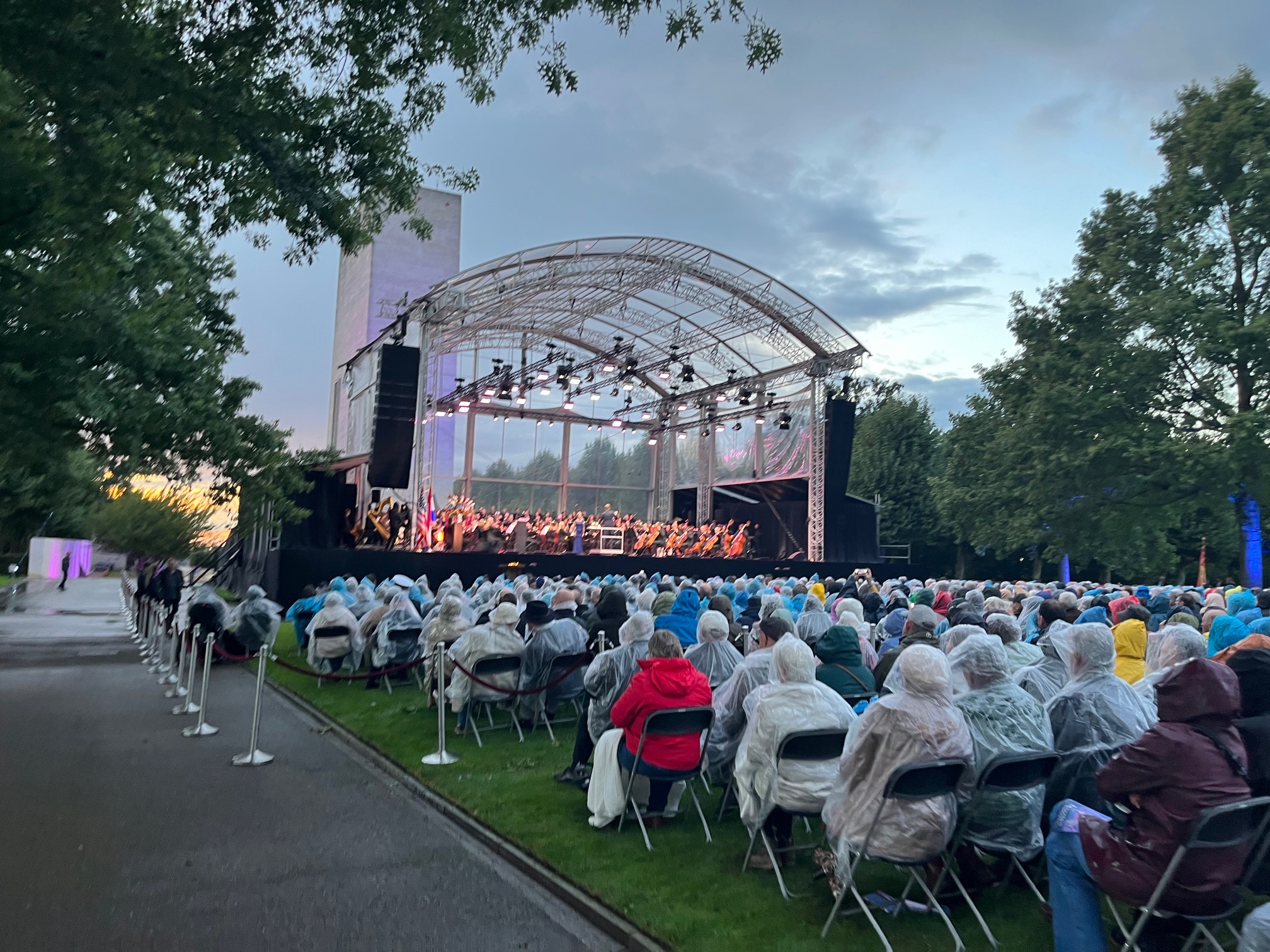I haven’t mentioned this before, but there’s a large WWII American cemetery about 6 kilometers from where we live, the only one in the Netherlands. Because it’s 80 years since liberation, the annual concert at the cemetery was especially big, and my 8 year old son and I went.

It was a pleasant evening of music, stories, and appropriate honoring of the dead. (There's a recording of the whole concert here.) The PhilZuid orchestra, which is marvelous, played on a huge stage set up in front of the main plinth overlooking the cemetery. White crosses to the right of us, white crosses to the left, as far as the eye can see, vivid against the green green grass. In the program, the stories of two soldiers killed in action were told, one in Dutch and the other English, and a third soldier—the first American to step foot onto liberated Dutch soil—was wheeled onto stage and a story read about him. Given that he’s at least 97 years old, he seemed as frail as a wisp of smoke, gathered under a blanket, looking out at the poncho-wrapped audience. I wondered what he was thinking. I quickly sketched in my mind a few scenes of the version of his story as Joseph Heller or Kurt Vonnegut would write it—it doesn’t seem possible that it wouldn’t be full of absurdity.
Inevitably I wondered some other things.
I was struck, first of all, that I must be a horrible American and an even worse American expat parent, in this sense: the first song by the orchestra was “The Star Spangled Banner.” I lifted Orri up so he could see the orchestra. (He was the only child in the audience, as far as I could see; in fact, he was the only person under 50 in the audience. We were surrounded by Dutch omas and opas who smiled at him in between bites of their broodtjes.) I told him that the song was the American national anthem; he’d never heard it before. Of course not—where would he have? A movie or two, perhaps. I admit, I got a little choked up as it played. I thought of the many other songs that seem like more appropriate national anthems, like “My Country, Tis of Thee” or “Battle Hymn of the Republic” or “This Land is Your Land,” but the anthem also lies close to my American heart. I remember being 24 years old, a resolute American exile, hearing the anthem with the flag waving in a gymnasium of a Luthern high school in Chia-yi, Taiwan and feeling surprised at the well of tears. I felt nothing when they played the Dutch national anthem next, a song I’ve never heard (or never recognized as such), except that I watched Orri’s face as he did recognize the song and then, to my surprise, began mouthing the words along with others around us—not very many, admittedly, but still some—who were singing the words too. Here was a new flavor in this cocktail of un/belonging that I continually sip: my American son knows the Dutch anthem, not the American one. That’s a gap. An oversight. Fortunately it’s correctable. I can also provide context when I do correct it.
I also wanted to know much more about the attitudes and opinions of the people sitting around me, very few of them old enough to have lived through the German occupation itself but all of them grown up in the aftermath. Why do they come to the American cemetery to honor the dead? Is it really as simple as an appreciation of the sacrifice? As simple as claiming someone else’s dead as your own? It can’t be that simple, I think, it’s never that simple. That’s what they assert in the speeches, but that can’t be the whole story. I wonder what else is going on, especially when you consider that Limburg is a major seat of electoral power for Geert Wilders’ far-right PVV. How many of the people sitting around us, honoring the soldiers who died to defeat fascism, support the fascism of Wilders? How do they square those two things? Was it possible that the people at the concert indeed see the threats and want to stop them, that they also equate “freedom” with other liberal principles? Or is it the other way around, that they hated the Germans less for the contents of Nazi philosophy than for the oppression and tyranny itself, an oppression which they also find in asylum policies and being “forced” to live with non-Europeans, non-Christians, and non-whites? In other words, that the “freedom” to which they were liberated also includes the freedom to kick down those who have sought refuge here? These questions hung over the warm fuzzies that the ceremonial honoring otherwise bestowed.
Also hanging over the proceedings and its warm fuzzies was a drone, a white blinking aviationally. Probably a security drone. The site was swarming with local police, Konijnlijke Marechaussee, and US and Dutch military. (Apart from local officials, the US ambassador was also present.) Orri remembered the Nantes Olympics, where we saw a dog handled by someone conspicuously wearing a “detection of explosives” jacket. Will they have dogs here? he asked. No, I said, but they probably have sensors all over. They had sensors at the Olympics too, and then I explained the rhetorical function of a bomb dog in the crowd. Why do I know this stuff.
One final thought —that I had, I’d like to meet the other person who was also thinking about this stuff—was about the honoring of the dead. Of course the military dead are honored; I’m American, and we have a major holiday, Memorial Day, dedicated to that fact. All those white crosses somberly inscribed with an individual’s name is the part of a normal world. But there’s no national holiday dedicated to any other dead. Not to the civilian dead, not to the ordinary dead; not to the victims of colonialism and racism and capitalism; not to the pacifists or the reformers or the protesters or the organizers who built a liveable society. And not to the forgotten people sloughed off by progress. In fact, there is no recognition at all that a nation is a community of the living build along with and indebted to a community of the dead — all the dead, all of them. It’s easy to honor “our” dead, those who belong to the same family or tribe. And those who participate in codes of power to which people are driven to aspire (money, politics, divinity, force). It would take an imagination of astonishing utopianism to suggest honoring the dead of others — for white supremacists to advocate for resources to restore cemeteries of enslaved, for capitalists to fund the return of human remains from museum collections, for white Texans to build monuments to Mexicans and Comanches. But that's where I am.
And yet perhaps an audience of Dutch people assembled to honor dead Allied soldiers was a faint glimmer of something else? I’m very interested to know what they see when they see all those white crosses to the left and white crosses to the right on the green green grass.
